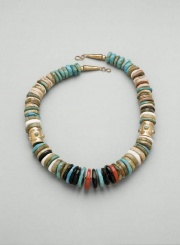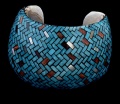Difference between revisions of "Oyster shell"
Jump to navigation
Jump to search
(username removed) |
(username removed) |
||
| Line 6: | Line 6: | ||
== Synonyms and Related Terms == | == Synonyms and Related Terms == | ||
| − | coquille d'huitre (Fr.); | + | coquille d'huitre (Fr.); écaille d'huitre (Fr.); concha de ostra (Port.); pearl white; oyster shell white |
== Additional Images == | == Additional Images == | ||
| Line 17: | Line 17: | ||
== Authority == | == Authority == | ||
| − | * | + | * R. J. Gettens, G.L. Stout, ''Painting Materials, A Short Encyclopaedia'', Dover Publications, New York, 1966 |
| − | * | + | * Ralph Mayer, ''A Dictionary of Art Terms and Techniques'', Harper and Row Publishers, New York, 1969 (also 1945 printing) |
| − | * | + | * R.D. Harley, ''Artists' Pigments c. 1600-1835'', Butterworth Scientific, London, 1982 |
| − | * | + | * G.S.Brady, ''Materials Handbook'', McGraw-Hill Book Co., New York, 1971 Comment: p. 132 |
* Art and Architecture Thesaurus Online, http://www.getty.edu/research/tools/vocabulary/aat/, J. Paul Getty Trust, Los Angeles, 2000 | * Art and Architecture Thesaurus Online, http://www.getty.edu/research/tools/vocabulary/aat/, J. Paul Getty Trust, Los Angeles, 2000 | ||
Revision as of 06:44, 24 July 2013
Description
Shells from any marine mollusk of the family Ostreidae. Edible mollusks, such as the Ostrea virginica, found in the Gulf of Mexico and the Chesapeake Bay, account for most of the shells currently produced. Pearl white, a white, calcium carbonate pigment is made by either crushing pearls or oyster shells. Oyster shells are also crushed then calcined to produce a high grade of commercial lime.
Synonyms and Related Terms
coquille d'huitre (Fr.); écaille d'huitre (Fr.); concha de ostra (Port.); pearl white; oyster shell white
Additional Images
Authority
- R. J. Gettens, G.L. Stout, Painting Materials, A Short Encyclopaedia, Dover Publications, New York, 1966
- Ralph Mayer, A Dictionary of Art Terms and Techniques, Harper and Row Publishers, New York, 1969 (also 1945 printing)
- R.D. Harley, Artists' Pigments c. 1600-1835, Butterworth Scientific, London, 1982
- G.S.Brady, Materials Handbook, McGraw-Hill Book Co., New York, 1971 Comment: p. 132
- Art and Architecture Thesaurus Online, http://www.getty.edu/research/tools/vocabulary/aat/, J. Paul Getty Trust, Los Angeles, 2000

